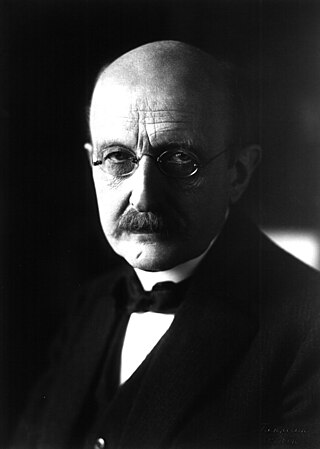
Max Karl Ernst Ludwig Planck was a German theoretical physicist whose discovery of energy quanta won him the Nobel Prize in Physics in 1918.

The University of Göttingen, officially the Georg August University of Göttingen, is a public research university in the city of Göttingen, Germany. Founded in 1734 by George II, King of Great Britain and Elector of Hanover, and starting classes in 1737, the Georgia Augusta was conceived to promote the ideals of the Enlightenment. It is the oldest university in the state of Lower Saxony and the largest in student enrollment, which stands at around 31,600.

The Ludwig Maximilian University of Munich is a public research university in Munich, Germany. Originally established as University of Ingolstadt in 1472 by Duke Ludwig IX of Bavaria-Landshut, it is Germany's sixth-oldest university in continuous operation.

The University of Freiburg, officially the Albert Ludwig University of Freiburg, is a public research university located in Freiburg im Breisgau, Baden-Württemberg, Germany. The university was founded in 1457 by the Habsburg dynasty as the second university in Austrian-Habsburg territory after the University of Vienna. Today, Freiburg is the fifth-oldest university in Germany, with a long tradition of teaching the humanities, social sciences and natural sciences and technology and enjoys a high academic reputation both nationally and internationally. The university is made up of 11 faculties and attracts students from across Germany as well as from over 120 other countries. Foreign students constitute about 18.2% of total student numbers.

Leipzig University, in Leipzig in Saxony, Germany, is one of the world's oldest universities and the second-oldest university in Germany. The university was founded on 2 December 1409 by Frederick I, Elector of Saxony and his brother William II, Margrave of Meissen, and originally comprised the four scholastic faculties. Since its inception, the university has engaged in teaching and research for over 600 years without interruption.

Goethe University Frankfurt is a university located in Frankfurt am Main, Germany. It was founded in 1914 as a citizens' university, which means it was founded and funded by the wealthy and active liberal citizenry of Frankfurt. The original name in German was Universität Frankfurt am Main. In 1932, the university's name was extended in honour of one of the most famous native sons of Frankfurt, the poet, philosopher and writer/dramatist Johann Wolfgang von Goethe. The university currently has around 45,000 students, distributed across four major campuses within the city.

The Max Planck Society for the Advancement of Science is a formally independent non-governmental and non-profit association of German research institutes. Founded in 1911 as the Kaiser Wilhelm Society, it was renamed to the Max Planck Society in 1948 in honor of its former president, theoretical physicist Max Planck. The society is funded by the federal and state governments of Germany.

The Max Planck Institute for Astrophysics (MPA) is a research institute located in Garching, just north of Munich, Bavaria, Germany. It is one of many scientific research institutes belonging to the Max Planck Society.

The Kaiser Wilhelm Society for the Advancement of Science was a German scientific institution established in the German Empire in 1911. Its functions were taken over by the Max Planck Society. The Kaiser Wilhelm Society was an umbrella organisation for many institutes, testing stations, and research units created under its authority.

The Max-Planck-Institut für Astronomie is a research institute of the Max Planck Society (MPG). It is located in Heidelberg, Baden-Württemberg, Germany near the top of the Königstuhl, adjacent to the historic Landessternwarte Heidelberg-Königstuhl astronomical observatory. The institute primarily conducts basic research in the natural sciences in the field of astronomy.

The Gottfried Wilhelm Leibniz Prize, or Leibniz Prize, is awarded by the German Research Foundation to "exceptional scientists and academics for their outstanding achievements in the field of research". Since 1986, up to ten prizes have been awarded annually to individuals or research groups working at a research institution in Germany or at a German research institution abroad. It is considered the most important research award in Germany.

The Berlin-Brandenburg capital region is one of the most prolific centers of higher education and research in the world. It is the largest concentration of universities and colleges in Germany. The city has four public research universities and 27 private, professional and technical colleges (Hochschulen), offering a wide range of disciplines. Access to the German university system is tuition free.
The International Max Planck Research School for Molecules of Life is a German centre for postgraduate training and research in life sciences. It is one among over 60 International Max Planck Research Schools in Germany. It is located in Munich and was established in 2005. The Ph.D. program is operated by the Max Planck Institute of Biochemistry and works in close collaboration with the Max Planck Institute for Biological Intelligence and two universities in Munich.
The Max Planck Institute of Neurobiology was a research institute of the Max Planck Society located in Martinsried, a suburb of Munich in Germany. It existed between 1984 and 2022 and merged with the Max Planck Institute for Ornithology to the new, joint Max Planck Institute for Biological Intelligence in 2023. Research at the former MPI of Neurobiology centered on the basic mechanisms and functions of the developing and adult nervous system. Main focus areas include the mechanisms of information processing and storage. It is one of 80 institutes in the Max Planck Society.

The Max Planck Institute for Innovation and Competition is a Munich, Germany, based research institute, which is part of the Max Planck Society for the Advancement of Science, which manages 84 institutes and research institutions. The institute was formerly known as the Max Planck Institute for Intellectual Property and Competition Law and the name was changed to Max Planck Institute for Innovation and Competition in view of the broader focus of the institute and its interdisciplinary character. The major research areas of the institute are intellectual property, innovation and competition. Apart from providing research support for scholars from across the world, the institute also publishes the International Review of Intellectual Property and Competition Law (IIC).

The Max-Planck-Institute of Quantum Optics is a part of the Max Planck Society which operates 87 research facilities in Germany.

The Heidelberg University Faculty of Law, located in Heidelberg, Germany, is one of the original four constituent faculties of Heidelberg University. Founded in 1386 by Rupert I, Elector Palatine, it is the oldest law school in Germany.
Albrecht von Müller is a German philosopher and former entrepreneur. Since 2000, Müller has been the director of the Parmenides Center for the Study of Thinking, which is run by the non-profit organization Parmenides Foundation and is associated with the Ludwig Maximilian University of Munich. He is also a teacher of philosophy at the Ludwig Maximilian University of Munich as well as teaching the theory of thinking at the MCA program of the international school for advanced studies in Trieste, SISSA His main fields of interest are the concept of time and the theory of thinking, and in these fields he has made various publications. Müller is also an external contributor to programs of the Human Science Center and the Munich Center of Neuroscience at the Ludwig Maximilian University. Furthermore, he serves on the board of trustees of the Max Planck Institute for Neurobiology and the Max Planck Institute of Biochemistry.

The Ernst Schering Prize is awarded annually by the Ernst Schering Foundation for especially outstanding basic research in the fields of medicine, biology or chemistry anywhere in the world. Established in 1991 by the Ernst Schering Research Foundation, and named after the German apothecary and industrialist, Ernst Christian Friedrich Schering, who founded the Schering Corporation, the prize is now worth €50,000.
















